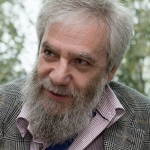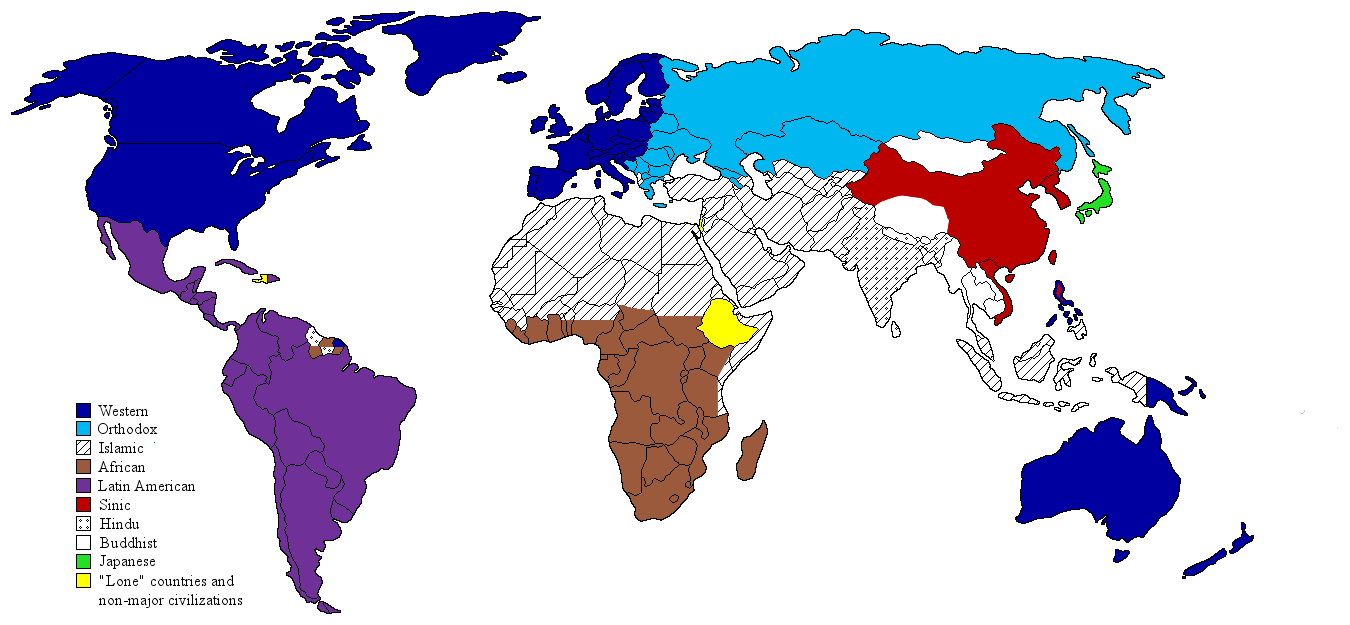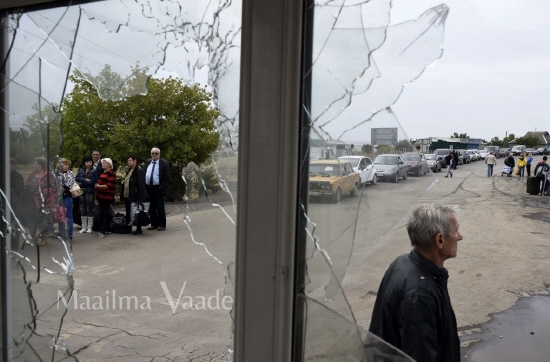Man-on-the-street interviews in Moscow yield quite an interesting result. Although the official line is that Russia is not even involved in Ukraine, when asked “what’s going on in Ukraine?”, a substantial number of people will say a war between Russia and the US. A more general answer is just as popular: it’s a war between Russia and the West. While I don’t have data to back it up, it’s hard to imagine that anyone in the US or the West would say the same. In any event, it is a significant symptom and it would be good to discuss the reasons behind them.
Russia’s distinct identity was formed in the last two centuries based not on ascribed positive Russian qualities but on negatives attributed to the West. As said, the Western qualities are not authentic but specially contrived for the purpose at hand.
As an idea, Europe in all of its ethnic diversity consists of two main components: Christian traditions and Roman law. Actually, both of these terms are inaccurate and aren’t independent of each other. We encounter Christian traditions in Africa, the Middle East and Asia, the Transcaucasus etc., so it would be more accurate to speak of Western Christianity, Catholicism and Protestantism, which unlike Eastern Christianity is intertwined with Roman law. As for Roman law, we should really refer to it as Athenian law, as it was from Athens that it spread to Rome and on to all of Western Europe. If we look at the borders of the European Union as they are now, we see that they coincide with the boundaries of Western Christianity and the Roman legal sphere. The European Union countries that are not part of that sphere (Bulgaria, Romania and Greece) are also the ones with the biggest difficulty integrating with the EU.
Russia’s distinct identity was formed in the last two centuries based not on ascribed positive Russian qualities but on negatives attributed to the West. As said, the Western qualities are not authentic but specially contrived for the purpose at hand.
As an idea, Europe in all of its ethnic diversity consists of two main components: Christian traditions and Roman law. Actually, both of these terms are inaccurate and aren’t independent of each other. We encounter Christian traditions in Africa, the Middle East and Asia, the Transcaucasus etc., so it would be more accurate to speak of Western Christianity, Catholicism and Protestantism, which unlike Eastern Christianity is intertwined with Roman law. As for Roman law, we should really refer to it as Athenian law, as it was from Athens that it spread to Rome and on to all of Western Europe. If we look at the borders of the European Union as they are now, we see that they coincide with the boundaries of Western Christianity and the Roman legal sphere. The European Union countries that are not part of that sphere (Bulgaria, Romania and Greece) are also the ones with the biggest difficulty integrating with the EU.
A map from Samuel P. Huntington’s Clash of Civilizations (1996) shows the author’s vision of the post-1990s world. Photo: Wikipedia
The religious component (Eastern vs. Western Christianity) has received plenty of attention. But I find that the legal component is much more important. The legal system devised by Solon (6th century BCE) was a unique event in human history. Usually laws were handed down by God to ancestors, and tradition took care of maintaining them. Ordinarily law is oral but it can be written. Shamash (or Marduk) handed down the text of the law to Hammurabi; Yahweh handed down the Decalogue to Moses. Divine laws are not up for discussion, they are to be obeyed. They are above the level of human intelligence. Why do the Ten Commandments forbid us to covet our neighbour’s cattle, but not lying or paedophilia? These aren’t dumb questions, but they are questions we can’t ask the drafter of the laws for an explanation.
Solon’s laws are quite different. Not that Athens lacked legislation before his time. The city-state had laws named after Draco the reformer. The laws were called draconian and the word began to be associated with harshness of legal norms. Draco’s name proved his undoing: actually his laws were not as harsh as those of Lycurgus in Sparta. Draco’s laws were not in any way dragon-like.
Solonian laws developed in a unique place in a unique cultural context : democracy. Besides laws, also born in the same time and place were philosophy, logic and rhetoric. None of them was an accidental techne (craft, knowledge or art); they were all integral parts of a single system. I term it a rhetorical ideal, but it could also be called a European ideal. It consists of three parts: 1) the human intelligence is capable of determining truth (philosophy) and of dealing with it so that it does not become false in the process (logic); 2) man is capable of expressing the truth in words (rhetoric); 3) man is capable of formulating true behavioural rules and obeying tem (law).
This ideal – a unique one – now seems more naïve. In any event, it is the opposite of the so-called Eastern ideal, the crux of which is that the truth can never be known and something does happen to be learned, it cannot be adequately expressed in human language, and thus it is better to be silent, and every behavioural action is the wrong action, so in fact it is better not to do anything at all.
Although the rhetorical ideal has never been explicitly articulated, it was a self-evident part of European culture up to the modern age and largely still remains valid today. Understandings of truth may change – i.e. Christian truth has fundamental differences to heathen or atheist truth. But the ideal – that one must say what one is thinking, and that one’s deeds must match one’s actions – has survived.
The illustrious teacher and European education reformer Jan Amos Komensky starts his famous work Orbis Sensualium Pictus with a dialogue: “Master: “Come, Boy, learn to be wise.” Boy: “What does this mean, to be wise?” Master: “To understand rightly, to do rightly and to speak out rightly are all that is necessary.” This text was memorized by students across many generations all over Western Europe.
Laws handed down by humans have a completely different status to laws of God. They can be supplemented, corrected and if necessary revised. Laws are interpreted not by a priest or ruler but by an independent judiciary, with all of it (philosophy, rhetoric, law) taking place competitively: accuser and defendant present their versions of the truth, and the court determines which of them is actually true, not just by applying the law but also by interpreting it. The interpretations may in turn have a legal status that informs subsequent court decisions.
In this sense, the Russian mentality is quite different from that of Europe. Whereas the European model of society is predicated on the supremacy of law, in Russian society (at least as the ideologists of the current regime describe it), power is supreme – power viewed as being both governance and ruler as well as force. Such constructs have been posited in the West, above all in the Third Reich, and the experience has been reckoned with in Russia. Publicist Andrey Shishkov has written a work entitled Vladimir Putin and Carl Schmitt. The decision by Putin that demolished the unipolar world.” True power does not stem from law; it is the law. Nevertheless, it should be noted that this prominent German philosopher of law did not have such a flattened view of things. Schmitt’s clearest formulation of the relationship between power and law can be found in an article from 1934, “Der Führer schützt das Recht” (The leader defends the law). Here we read that the Führer, the supreme sovereign leader is vested, is the effectuator and protector of the law. Thus any talk of the Leader acting illegally is a contradiction in terms. Still, unlike Russian thinkers, Schmitt is least concerned with legal nihilism.
To sum up, we can say that the principle of Western society is based on the supremacy of law, which is expressed by the fact that legal power is autonomous and independent; laws have the force of power; and political decisions have a legal basis.
It’s different in Russia. The reaction of “philosopher” Aleksandr Dugin to losing tenure at Moscow University is characteristic. The fact that such a charlatan was a professor at Russia’s most prestigious university is a scandal in itself, but this wasn’t the reason for his firing; rather it was his overzealous support for Putin in his aggression against Ukraine (besides a direct slight at the Ukrainians as a people, Putin did not like the fact that Dugin was talking about plans for a conquest of Ukraine as if he, Putin, had approved them.) Formally, the firing itself was completely arbitrary and illegal. Yet Dugin, who was very disappointed, writes that there was no possibility of appeal. “Power is power and in Russia it takes precedence over the law. I do not contest that this is the general principle, and thus I don’t contest a specific case where arbitrariness affects me personally. This is Russia and the stanchion of power is what I accept and support. Including cases that seem to be, mildly put, undignified. It comes down to the principle.” Dugin’s words are reminiscent of the communists executed during the Great Terror who shouted even as they shot: “Long live Stalin!” Or an example from an earlier time when the oprichnik Vassilys Gryaznoi fell prisoner to the Tatars in Crimea and Ivan the Terrible did not initially ransom him release (he was considered expendable). “Vasyutka” first reminds us that he was not captured during a rabbit hunt but whilst fighting in the tsar’s service and that he himself killed six Tatars and wounded 20. “First I regaled you, sire, at tableside, now I due for God and you.” But in spite of his desperate state of mind, he begrudges the tsar nothing: “Sire, like God, you perform acts both great and small.”
While the principle of dura lex, sed lex (it is a harsh law but it is still the law) formulated in medieval times still holds in Western Europe, the Russian principle might be phrased durus rex, sed rex.
A man walks by a broken window as people wait in line to cross the border to Russia on 12 September 2014 in Izvaryne, a border post near Krasnodon, eastern Ukraine. European Commission head Jose Manuel Barroso warned on September 12 that the Ukrainian ceasefire was not enough to achieve long-term peace and chided Russia over its “unacceptable behaviour” in its western neighbour. New EU sanctions sank the rouble to a new low as strongman Vladimir Putin brushed off the latest punitive measures against Russia and accused the West of using Ukraine to destabilise international relations. Photo: Scanpix
Russia’s aggressive response to Euromaidan – completely disproportionate from the perspective of the West – can be explained above all by cultural/psychological factors. Even if we leave aside Putin’s obvious fear of Maidan becoming contagious and spreading to Russia, the Ukrainian reorientation to Europe struck many Russians as a stab in the back. Putin’s regime is based on the opposition of the Russian identity to the West. As a Russian blogger quipped, Putin is like Plato’s demiurge. He creates the world out of ideas – he had the idea that Russia was surrounded by enemies and lo and behold, after a while it turned out that way. But in this context the Ukrainians are not just enemies (one of many, that is) but enemies par excellence. The “Western” aggressiveness, duplicity and hypocrisy have all been attributed to Ukraine in superlatives. The most elemental xenophobic models such as the wrong food customs and improper sexual intercourse have been resorted to. The change was so sudden and clear that it could be expressed in the form of a table:
| Ukraine and Ukrainians prior to 2014 | Ukraine and Ukrainians 2014 |
| Ukrainians are a fraternal nation, they are practically the same people as the Russians | (Western) Ukrainians are not Slavs; they are a mix of Jews and Celts or even Polovetses (no matter that these variants are mutually exclusive) |
| Ukrainians and Russians have a shared history | Ukrainians have not history at all, they are a Russophobic project of the Austrians |
| Ukrainians are friendly and humorous | Ukrainians are Nazis |
| Ukrainians and Russians have shared values | Ukrainians are (sexual) perverts |
The opinions on the right could be taken for those of some extremists or anonymous Internet commentators. But in fact there’s an authoritative politician, opinion leader or even scholar behind each ones. For instance, the Ukrainian genetic analysis was “conducted” by economist Matveichev, who has since removed his text, but it still circulates anonymously online in tens of iterations.
Official Moscow fights the “rewriting of history.” Yet there’s no country in the world where history is not rewritten so actively as it is today in Russia. After the annexation of Crimea, Putin ordered that the role of Crimea in Russian history be accorded due treatment in school textbooks. The Russian-language book market is seething with anti-Ukraine writing, with a number of them being clear forgeries. For instance, a John A. Armstrong treatise from 1980, Ukrainian Nationalism, published by a Ukrainian academic publishing house in the US, contains nothing against Ukraine or Ukrainians. In 2008, a Russian translation of the book was released, bearing the subtitle “Facts and Research.” But another edition of the book was published in 2014, now with the title “Roots of Ukrainian Nazism: where Ukraine ended up in the 21st century”(1). If you can’t find it, you have to make it up. Found in reprint, as they say.
References:(1) John Armstrong: Istoki samostiinovo natsizma. K tshemu prishla Ukraina v XXI veke. Moskva, 2014
Mihhail Lotman is a Professor of Literary Theory and Semiotics at the Department of Cultural Theory at Tallinn University |  |







